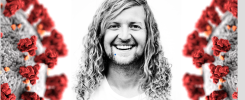The Advent season is by far my favorite time of year. While I know that Advent and Christmas do not likely reflect the season of the year when Jesus was actually born (don’t @ me, seminary bros,) the longing of Advent aligns so well with feelings that accompany this time of year. The sun goes down earlier in the day and shines less brightly when it is out, which contributes to feelings of depression and loneliness.
The weather is colder, causing us to insulate and bundle together for comfort. Every other year we come out of an election season that dominates our collective psyche in polarizing and even traumatizing ways. Advent feels like a deep exhale awaiting the promise of a rejuvenating inhale; a sigh of relief that longs for a breath of fresh air.
It is a season of darkness that I associate with artificial lights. I adore Christmas lights, especially colorful ones. Yes, they are fake, and can feel performative. But that’s precisely what I like about them. I experience them as a way we choose to fight off the darkness of this season. As we wait and hope, we choose to light up our communities as extravagantly as we know how. To me, it represents a communal fight against despair; putting them up in my apartment and seeing them as I drive around renews the fight in me against my own despair and the despair of the world.
In this way, the lights represent a belief that light can drown out darkness. It’s the message of John 1 about Jesus, that “the light shines in the darkness, and the darkness did not overcome it.” It’s a metaphor that I hold most sacred: no matter how much darkness there is, darkness cannot extinguish light. Light always illuminates darkness, even if only the smallest amount.
In Advent, we commemorate the waiting for the light of the world, as it gets darker and darker. It is a season of doubt and despair, with just an inkling of hope; like a single colored Christmas bulb in a blacked-out auditorium. It’s a season where “belief” is harder and harder to come by. In this time, I light up anything I can, no matter how artificial.
Something I was given years ago that sustained me during my long season of deconstruction, that feels particularly true each Advent, and all the more this year, is this:
Wanting to believe is the same thing as believing.
If you find yourself in a period of doubt, despair, or deconstruction, as the world grows darker and colder, be reminded that belief itself is simply a holding on; a desire for the best hopes for God’s world to come true, to be true. Take it from Mary, whose Magnificat declares the liberation of the lowly still nine months before Jesus would ever be born, and 30 years before he would begin to bring “good news to the poor.” She has little to count on except her hopes. A short chapter after this, Luke says that Mary “treasured up all these things and pondered them in her heart.” She would need to, because what she wanted to believe about her son was still a long way out.
If you find yourself in this season wondering what you believe, or whether you believe, I encourage you to ask a new question. What we have called “Belief” in the Church for so long is an impossible proposition: expecting intellectual assent to things that are unknowable, ineffable, and decidedly counter-intellectual. “Belief” in God, in Christ, is not about affirming doctrines, studying systematic theology, or forming theses. (Though we are grateful for those who do this work in ways that strengthen faith rather than measure it.)
Belief is about hope and desire – that the teachings of Jesus are true, that forgiveness and love are the right ways to live, that the world is being reconciled to God, that light shines in the darkness and the darkness, however vast, cannot win.
Belief isn’t an assertion; it’s a confession. We confess that against overwhelming evidence of darkness and despair, we still hope that God is Love, and that Love is overcoming the world.
In this especially dark Advent, I encourage you to practice and celebrate whatever reminds you of these things, that you may treasure them and store them in your heart. For me, I will light up my world with artificial colors to sustain my hope that the Light of the World has come, is coming; has won, and is winning.


Comments are closed.